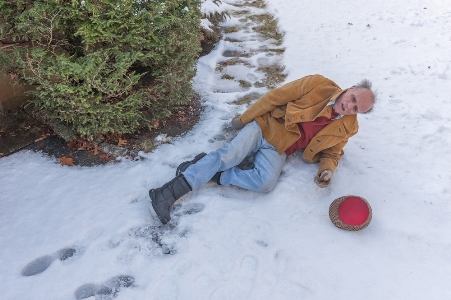
Falls and fall-related injuries are a common and serious problem for older people. People aged 65 and older have the highest risk of falling, with 30% of people older than 65 and 50% of people older than 80, falling at least once a year.
The human cost of falling includes distress, pain, injury, loss of confidence, loss of independence and mortality. Therefore falling has an impact on quality of life, health and healthcare costs (~£2.3 billion per year).
Fortunately, there are a few simple things that can be done to reduce your risk of falling, and knowing where to turn for help and advice can make a significant difference to your risk of falls, confidence levels and recovery from any injuries sustained.
The National Institute for Health and Care Excellence (NICE) have released a set of guidelines from 2013 to establish common risk factors and management tools for the prevention and treatment of falls for people over the age of 65, however some of the information can also be useful to those under 65 suffering from frequent falls or a fear of falling.
If you have sustained one or more falls in the last 12 months, or have a fear of falling, it’s recommended that you see a healthcare professional such as a GP or Physiotherapist for multifactorial assessment to identify if there are any risk factors that can be reduced or treated. This can include a review of your:
- strength and balance
- walking (gait) pattern
- neurological and cognitive assessments
- medications and past medical histories
- eye sight
- footwear
Treatments will vary depending on the risk factors identified, however strength and balance rehabilitation combined with education and advice on these risks, can drastically improve confidence and help prevent falls. This can easily be done by seeing a Physiotherapist who can create a tailored treatment programme for you that includes advice, exercise and mobility aids amongst other things. They can also teach techniques for getting off the floor in the event of a fall. The same can be said for those who have already sustained an injury from a fall. Seeing a specialist such as a Physiotherapist can significantly increase your recovery and improve your confidence to get back on your feet safely.
During the winter months, the risk of falling can be elevated from hazardous weather conditions and slippery floors. To reduce your risk of falling, ensure you go out with adequate footwear and have a friend, family member or carer assist you. In particularly hazardous conditions such as heavy rain, snow and ice, try and minimise your need to go out by pre-planning for food and essentials you may need so you can stay indoors. Inside, ensure that the home is clutter-free and that trip hazards are removed – this can be simple things such as rugs and mats or shoes left in the corridors! Try not to wear open-backed slippers with poor grip and regularly check your soles to ensure the grip is still in a good condition. For a thorough home assessment, you can ask your GP to refer you for a ‘home hazard assessment’.
Finally, in the event of a fall, a few simple things can be done in the home to get you the support you need and minimise the impact of your fall. Try leaving a phone at a height that is easily accessible from the floor, or carry a mobile telephone with you with the numbers of close by family/friends or neighbours. You can also consider pendant alarms that can be worn around the neck to contact your ambulance service in the event of a bad fall. Keeping blankets, snacks and water at lower levels can also be very helpful in-case help is delayed in getting to you.
It is always important to seek out expert orthopaedic care for fall-related injuries, so if you have any concerns about your own or a family members risk of falling, so do not be afraid to see someone before it is too late!
For further information, contact the Physiotherapy Department at New Victoria Hospital or see your GP. Further information can be found online at: https://www.nhs.uk/conditions/falls/
To make an appointment with New Victoria Physiotherapy call 020 8949 9040 or:












